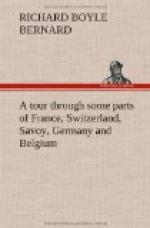The chief manufacture of Geneva is that of clocks and watches; in the period of the prosperity of Geneva, this trade was calculated to afford employment to five or six thousand persons, but at present it is much reduced. There are a considerable number of goldsmiths, and the ingenuity of the Genevese, produces very curious musical-watches, snuff-boxes, and seals, many of which are sent to Paris and London, where they find a ready sale; they are sent likewise to Persia and to America, there are considerable manufactures also of calico, muslin, &c. and a good deal of banking business is transacted. Perhaps there is no example of a city so destitute of territory, which has obtained such commercial celebrity, and the persevering industry of its inhabitants, enabled them to place large sums of money in the funds of other nations, particularly of England. The revenues of the state are much exceeded by those of many individuals; but, during the oppressive government of France, the taxes of Geneva were nearly quadrupled.
The population of Geneva and its territory, having been so differently stated as to leave the truth involved in ranch uncertainty, M. Naville, a senator, who possessed every facility for making the necessary enquiries, published a calculation, which assigns to the republic a population of 35,000, of which number 26,000 resided in the city. This is a very large number if we consider that the territory of this little state is so limited as, according to M. Bourritt’s Itinerary, to contain only 3 7/100 square leagues; being about 11,400 inhabitants to each square league. But, contracted as their territory certainly is, those citizens of Geneva, with whom I have conversed, do not seem to wish its extension. They fear the introduction of religious dissensions, as the Savoyards, (on which side it could be most easily extended) are Roman Catholics and by no means cordial with their neighbours, the Hugonots of Geneva, as they call them. Nor would the nobility of Savoy wish to be the subjects of so popular a government as that of Geneva. Religious differences have, at all times, been productive of the worst species of civil discord, and the Genevese (although they tolerate most fully all religious sects) are undoubtedly stronger at present, with their limited possessions, than they possibly could be with any increase of territory, accompanied by the chance of such unfortunate dissensions.
All they seem desirous of, at present, is to see their little state consolidated; it being at present intersected by the possessions of France, the Canton of Vaud, &c. in such a manner as to oblige the Genevese to pass over some portion of the territories of those states, in visiting many of their own villages. But more of Geneva hereafter, as although I had so recently arrived there, I was soon to quit it for a short time.
I found at my hotel a party, consisting of two of my countrymen and a French gentleman, who were waiting for a fourth person to join them, in making an excursion to the celebrated scenes of Chamouny and Moutanvert.




